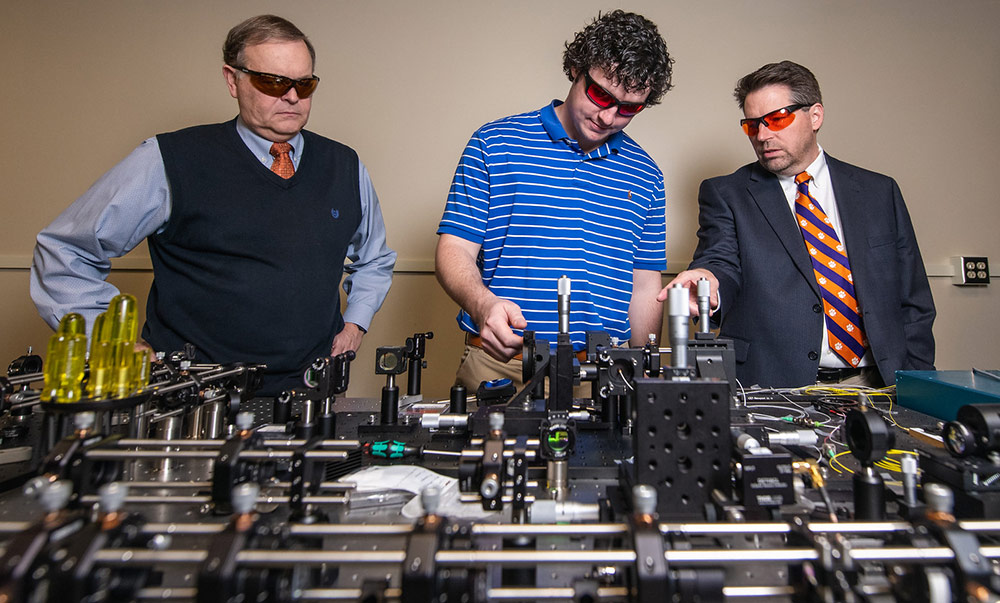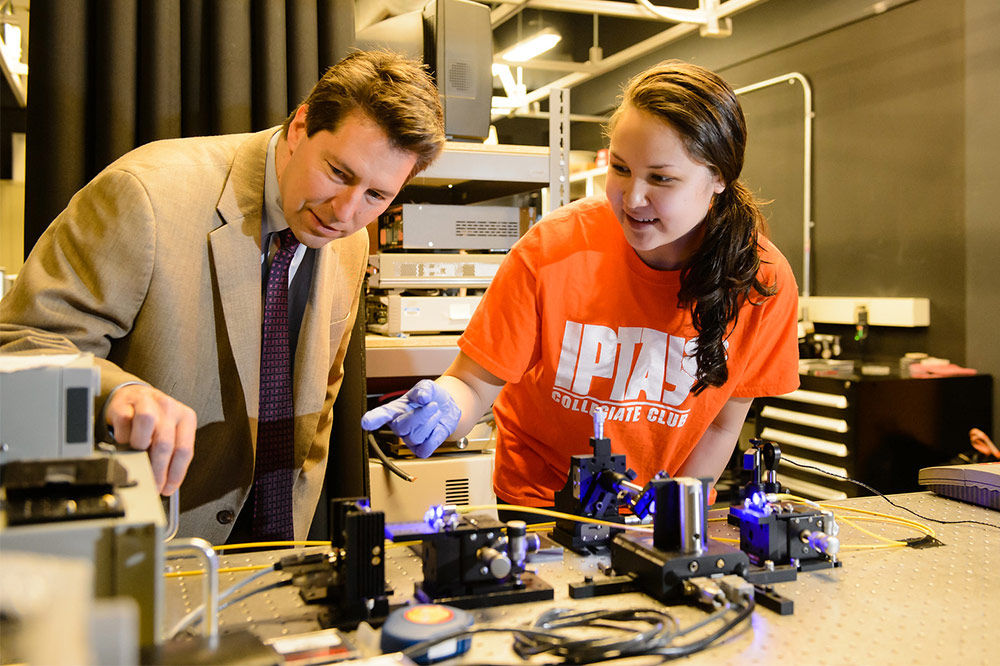Spinning light could lead to new ways of communicating and gathering data

Top researchers from across the country are developing new technology to control an unusual property of light that could make it possible to channel through fog, murky water and thermal turbulence, potentially leading to new ways of communicating and gathering data.
The research brings together researchers from six universities and is led by Eric Johnson, the PalmettoNet Endowed Chair in Optoelectronics at Clemson University. The team has received a $7.5 million grant to fund the project through the Office of Naval Research’s Multidisciplinary University Research Initiative (MURI).
The research sharpens the focus on “orbital angular momentum,” a way of making light twist or spin in specific directions, even reversing course from clockwise to counterclockwise, or vice versa, as it travels from one point to another.
This twisting and spinning light can move tiny bits of matter, such as the water molecules that create fog or the bits of material that make water cloudy. The idea is to use these properties in space and time to cut channels through cloudy air or water.

Eric Johnson (right), the PalmettoNet Endowed Chair in Optoelectronics, and Joe Watkins (left), director of General Engineering, work with a student at their lab in the Duke Energy Innovation Center.
Researchers are also studying how it could be possible to use the spinning light to push through thermal turbulence, the natural occurrence that makes it look as if waves are rising from a highway on a hot day.
The channels could open a wide range of possibilities. It could be possible, for example, to send pulses of light through a channel to communicate, similar to how a fiber-optic cable carries information, except without the cable.
The channels could also open the door to new ways of gathering data by combining them with a broad range of techniques known in the research community as “sensing.” For example, it could be possible to use these spinning beams of light from a satellite to the ocean to monitor water temperature and currents.
“First of all, we have to understand what’s happening at the fundamental level,” Johnson said. “It’s as if we have these knobs to control that we never had before, and we want to know what we can do with them. We don’t understand them well enough to say what the limitations might be or how we can further exploit the possibilities.
“This research will allow us to do that. At the end, we will have that fundamental understanding and know where we can go with it at the application level.”
This project gives us a solid, five-year research program that allows us to touch students at all levels. It gives them real-world experience both in the fabrication and the application in the integration of technologies. That’s something students are always clamoring for– some experience outside of the classroom.
Eric Johnson, PalmettoNet Endowed Chair in Optoelectronics at Clemson University
In its research, the team is using a 20-meter tunnel designed by Joe Watkins, who conducted research on directed energy when he was a captain in the Navy and is now General Engineering director and mechanical engineering professor at Clemson University.
The tunnel, set up in a Clemson lab at the Duke Innovation Center in Anderson, blocks airflow from the environment and protects researchers from the laser beam. Inside the tunnel is a system that generates a turbulent atmosphere for light to pass through.
When researchers shot a laser down the tunnel as a demonstration, the green beam hit a white rectangle at the other end, creating concentric circles with waves rippling through them.
“We’re pushing a lot of turbulence into 20 meters,” Watkins said. “Even though it’s a 20-meter path, it’s as if the beam had traveled 1-2 kilometers. It’s a way to do a controlled experiment in the lab that would be impossible outside. The optical path within the tunnel can be extended to 100 meters, allowing us to see severe turbulence effects that would be similar to a 5-10 kilometer path outside.”
Some of the top researchers in their fields are collaborating on the project as part of this MURI award. They include:
- Natalia M. Litchinitser, a professor of electrical and computer engineering at Duke University
- Alan E. Willner, the Steven and Kathryn Sample Chair in Engineering at the University of Southern California
- Robert Boyd, a professor of optics and physics at the University of Rochester
- Aristide Dogariu, the Pegasus Professor of Optics and Photonics at the University of Central Florida
- Greg Gbur, a professor of optics and physics at the University of North Carolina at Charlotte
Daniel Noneaker, associate dean for research in Clemson’s College of Engineering, Computing and Applied Sciences, said the project will help raise the University’s reputation for excellence in research.
“Multidisciplinary University Research Initiatives are highly competitive grants involving some of the nation’s most talented researchers, who come from some of the most elite institutions of higher education,” he said. “Only 26 universities were selected to lead these initiatives, and Clemson is one of them. The award is a testament to the University’s investment in key infrastructure and the team’s hard work.”
Plans call for 18 Ph.D. students a year to work on the project, including eight at Clemson. Undergraduates will also be involved and coordinated by Watkins.
“One of the most exciting parts of this project is that it gives us a solid, five-year research program that allows us to touch students at all levels,” Johnson said. “It gives them real-world experience both in the fabrication and the application in the integration of technologies. That’s something students are always clamoring for– some experience outside of the classroom.”

Eric Johnson works alongside a student at the Clemson University Advanced Materials Research Laboratory.
Johnson said part of what makes Clemson an ideal place for the project is a series of investments in unique facilities over the past decade, including the Micro Fabrication Facility, a “clean room” focused on the development, design and fabrication of new types of optical components.
Researchers control the spin of light by shining it through the components.
“It sounds simple to spin the light in one direction and then spin it in another direction in a controlled fashion,” he said. “But the ability to do that takes a different technology in terms of how the optical components are made themselves. It’s the capabilities that we have that enable us to look at this functionality.”
Hai Xiao, chair of the Holcombe Department of Electrical and Computer Engineering, said that Johnson is uniquely qualified to lead the research.
“Dr. Johnson is a highly respected and deeply experienced leader in the field of optoelectronics,” Xiao said. “With the team he has built and the infrastructure Clemson has in place, they are well-positioned for success.”
Anand Gramopadhye, dean of the College of Engineering, Computing and Applied Sciences, said the grant sets the stage for transformative research and world-class educational experiences.
“This project brings together a multidisciplinary dream team of leaders to address some of the key challenges in an emerging technology,” Gramopadhye said. “The amount of the award reflects its importance, its potential and the hard work of the team. I congratulate Dr. Johnson and his teammates on this project.”